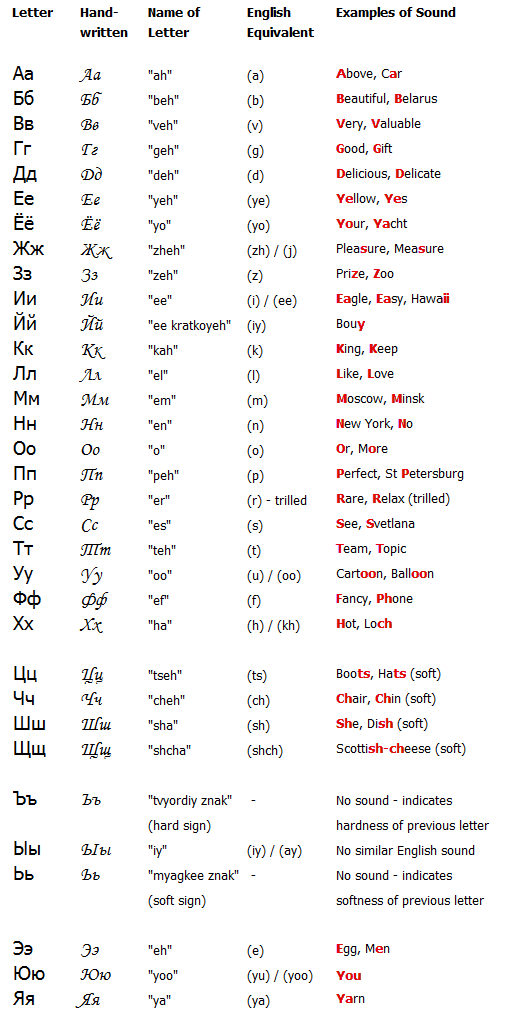|
|
|
| | Russian Alphabet & Pronunciation |
The Russian language is a member of the Slavic group of the Indo-European family of languages. Other languages belonging to this group are Belarussian, Bulgarian, Czech, Macedonian, Polish, Serbo-Croatian, Slovak, Slovenian and Ukrainian.
The principal language of administration in the former Soviet Union, Russian is spoken by about 170 million people as a first language. It is used by an estimated additional 100 million as a second language in the countries of the Commonwealth of Independent State and of European Europe. Because of its large number of speakers and its leading position in the former Soviet Union, Russian is one of the chief languages of the world. Used officially by the United Nations, it is important in scientific writing as well. The great literature works written in Russian also have made the language culturally significant.
The Russian language uses the Cyrillic alphabet. The Cyrillic alphabet has augmented from Greek uncial script, using the older Glagolitic alphabet for sounds not available in the Greek language. Cyrillic and Glagolitic were invented by Greek brothers Saints Cyril and Methodius. It was considered that while Cyril may have enhanced Glagolitic, his students, possibly from the first literary school in the medieval Bulgarian Empire (Preslav Literary School), developed Cyrillic from Greek during the 890s as a more suitable script for church books.

Historical Development of Russian
The historical development of Russian is not easy to trace because until the 17th century the religious and cultural language of the Russian people was not Russian but Church Slavic. However, within Russia the latter language became sufficiently altered by the vocabulary and pronunciation of spoken Russian to be transformed into a Russian form of Church Slavic adapted to Russian needs. The earliest existing document containing Russian elements is and Old Church Slavonic text from the 11th century.
When Peter the Great undertook to westernize Russian in the early 18th century, the Russian language was subjected to Western influences and absorbed a number of foreign words. Peter was the first to reform and simplify the Cyrillic alphabet used for Russian.
In the late 18th and 19th century, partly as a result of the work of the great Russian writer Alexander Pushkin, the Russians succeeded in throwing off the dominance of Church Slavic and developing their own tongue into a literary language, which was, nevertheless, influenced and even enriched by the Church Slavic legacy.
Literary Russian is based on the dialect used in and round the city of Moscow, which became the leading cultural center. Extensive reforms, aimed at simplifying and standardizing Russian writing and grammar, took place after the Revolution of 1917.
Cyrillic Alphabet
The Cyrillic alphabet became increasingly widespread over the 12th century. During the next ten centuries the Cyrillic alphabet was adapted because of changes with spoken language developing regional variations. You can find languages across Eastern Europe and Asia written using the Cyrillic alphabet.
The Russian alphabet consists of 33 letters, 11 vowels, 20 consonants and 2 letters which do not have a sound (instead they make the word harder or softer). It is not that easy to master Russian pronunciation because the accent is free, i.e., it can be placed on any syllable. Thus, there are no set rules for stress. The accent of each word has to be learned separately. In fact, the position of the accent on a given word may vary as the word's case and number change when it is inflected. Some words that are spelled alike are distinguished only by a different stress. In addition, no significant differentiation is made between long and short vowels.
Grammatically, Russian is highly inflected. The noun has six cases with an occasional seventh case, the vocative. There are three declensional schemes and three genders. Although the verb has only three tenses, it is enabled by a feature called aspect to express numerous subtle shades of meaning, some of which cannot be rendered in other languages. In addition, The Russian verb has five moods and four voices.
Slang
Russian is a very rich language with a very large number of slang words and expressions. New words and expressions appear on a constant basis with many being derived from the English language.
Teenagers have their very own slang, as do members of various professions. If you are going to work in an office environment, you will hear a lot of words that sound English but aren't. If you want to understand more of what people and teenagers talk about, ask your Russian teacher for help.
Many teachers are reluctant to teach slang (not to mention swear words), but you can always turn to your Russian colleagues and friends for explanations and translations of words and expressions. When learning and using slang, remember that there are many shades of politeness, not-so-politeness and rudeness.
|
| |
|
|
|